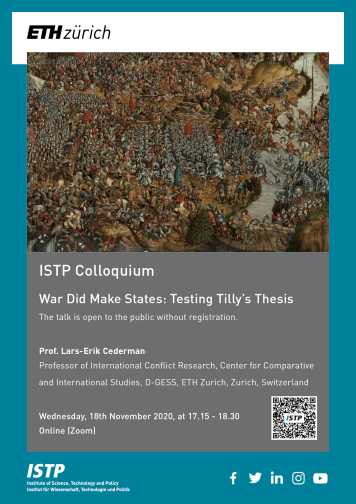Colloquium: Prof. Lars-Erik Cederman
Wednesday, 18th November 2020, at 17.15 - 18.30
Online (Zoom)
War Did Make States: Testing Tilly’s Thesis

Charles Tilly’s classical claim that “war made states” in early modern Europe remains controversial. The “bellicist” thesis has attracted theoretical criticism both within and beyond its original domain of applicability. While several recent studies have analyzed the internal aspects of Tilly’s theory, there have been very few systematic attempts to assess its logic with regard to state expansion. In this paper, we test the bellicist theory directly by aligning historical data on European state borders with conflict data, focusing primarily on the period from 1490 through 1790. Proceeding at the systemic, state and dyadic levels, our analysis confirms that warfare did in fact contribute to the territorial expansion of European states before (and beyond) the French Revolution.
This contribution is joint work with Luc Girardin, Paola Toro-Galano, and Guy Schvitz.
About Prof. Lars-Erik Cederman
Born in Sweden in 1963, Lars-Erik Cederman received an M.Sc. in Engineering Physics from the University of Uppsala in 1988 and an M.A. in International Relations from the Graduate Institute of International Studies in Geneva in 1990 before obtaining his Ph.D. in Political Science from the University of Michigan in 1994. Using computational modeling, he wrote his dissertation on how states and nations develop and dissolve. He has since taught at the Graduate Institute of International Studies in Geneva, Oxford, UCLA, and Harvard.
Lars-Erik Cederman is editor of Constructing Europe's Identity: The External Dimension (Lynne Rienner, 2001) and the author of Emergent Actors in World Politics: How States and Nations Develop and Dissolve (Princeton University Press, 1997), which received the 1998 Edgar S. Furniss Book Award. He is also the author and co-author of articles in scholarly journals such as the American Political Science Review, European Journal of International Relations, International Organization, International Studies Quarterly, Journal of Conflict Resolution, and Proceedings of the National Academy of Sciences. His main research interests include computational modeling, International Relations theory, nationalism, integration and disintegration processes, and historical sociology.
- You can read a summary of the colloquium talk on our Reports webpage.